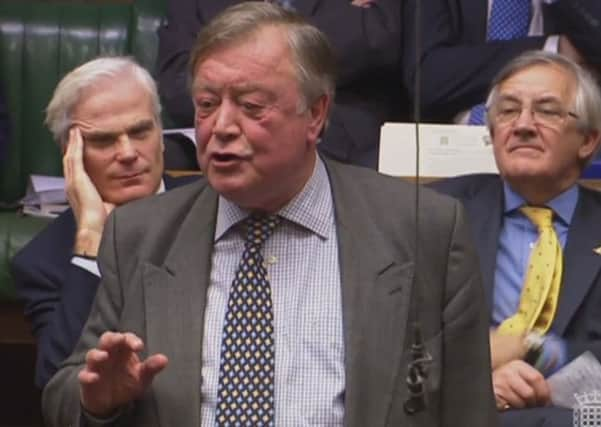Euan McColm: The speech Corbyn could never have made


He spoke with great wit and considerable derision of the fantasy peddled by Brexiteers that the UK will easily strike new trade deals after leaving the European club. And he cut through the crap spun by Tory Leavers about “sovereignty” to accuse them of being members of an “anti immigrant” party.
Had Corbyn delivered this ferocious speech, almost half of the country – the 48 per cent who voted last year in favour of remaining in the EU – might reasonably have believed they had a new champion, someone to stand up for their views.
Advertisement
Hide AdAdvertisement
Hide AdBut, of course, it wasn’t Corbyn who made the case, on Wednesday, for rebelling against the government; it was Tory MP Ken Clarke.
Clarke – a committed Europhile – filled the space created by Corbyn’s complete failure to grasp the importance of Brexit to the Labour Party. The leader of the opposition will rue the day he allowed this to happen.
Labour’s position on Brexit is as wrong-headed as any adopted by a British political party in living memory. Having campaigned against leaving the EU, Labour – with the exception of a few rebels – threw its support behind the triggering of Article 50. Corbyn put in place a three-line whip in an attempt to ensure the sort of loyalty that he rarely displayed while he was a backbencher.
One wonders what on earth the leader of the opposition believes he has achieved by lining his party up behind the Conservatives.
Yes, we’ve heard the argument from Labour on this: the “people” have spoken on Europe and it is therefore the opposition’s duty to see that their wishes are delivered. We can reasonably assume that Labour strategists – and I use that word sarcastically – looked at the number of Labour supporters who voted Leave last year and decided that they might be lost for good if the party did not back the Brexit bill.
Scottish Labour has news for those great thinkers – they’re already gone.
A sizeable minority of Labour voters backed the Yes campaign in the 2014 Scottish independence campaign and – to nobody’s great surprise – they came out of the other end of that process with new loyalties. Those voters saw the SNP as the stout defenders of their beliefs.
Foolishly, Scottish Labour believed that it could win those voters back and it spent the following months delivering a weak message on the constitution. It was perfectly conceivable, said senior party figures, that Scottish Labour politicians might campaign for a Yes vote in a future referendum.
Advertisement
Hide AdAdvertisement
Hide AdMeanwhile, the Scottish Conservative leader Ruth Davidson installed herself as the champion of the Union. She would speak loudly and clearly for the majority who had rejected the SNP’s proposal to break up the UK.
We know how that played out: the Tories leapfrogged Labour to become the main opposition party at Holyrood. Scotland’s politics had become, predominantly, an argument over the constitution and voters wanted to know who was on their side. Instead of learning the lesson of the Scottish referendum, the UK Labour Party is repeating the Scottish party’s mistake.
Traditional Labour voters – particularly in the north of England – did not rally around their party’s Remain position last year; instead, they were seduced by the “we’re on your side” rhetoric of Ukip (painful as it may be for some in the SNP, the same anti-establishment sentiment that benefits the kippers in England also ensures the nationalists currently dominate Holyrood). Those voters want a hard Brexit, which will see tougher immigration rules.
By pandering to those voters, what message does Labour send to the two-thirds of its supporters who found themselves on the losing side last year? Those people – a sizeable chunk of the 48 per cent who voted to remain – demand a protector of their principles.
Corbyn’s Labour has shown us that it cannot be counted upon to fill that role. Just as Scottish Labour found itself in a constitutional no man’s land, trying to keep both sides happy, so now does Corbyn.
The SNP showed in 2014 how being on the losing side of a referendum can be turned into something positive. Those who voted Yes had a natural home with the nationalists and the party went on to win a landslide in the 2015 general election and to secure a third Scottish Parliament victory last year.
Had Corbyn styled his party as the home of Remain voters, perhaps he might have achieved something similar. Instead, he’s too weak on this issue to appeal to either Leavers or Remainers.
Liberal Democrat leader Tim Farron and Angus Robertson of the SNP have, instead, emerged as the Westminster leaders who speak for Remainers.
Advertisement
Hide AdAdvertisement
Hide AdWith Donald Trump in the White House and the right on the rise across Europe, moderate voters have never been in greater need of defenders. Last week, the UK Labour Party had the opportunity to seize that mantle. Instead, Corbyn confirmed his party’s irrelevance. If Labour MPs meekly line up with Tories to back a plan most of them believe to be suicidal, what purpose do they serve?
None, so far as I can see.
Gordon Aikman was a brave and beautiful young man who made the most incredible difference during a life cut tragically short.
When he was diagnosed with Motor Neurone Disease three years ago, he devoted himself to raising funds to find a cure for this damnable illness.
A former head of research at the Better Together campaign, Gordon brought together political opponents in support of his objective. By the time he died, aged 31, on Thursday, he had raised more than £500,000 for MND research. If you’d like to donate in his memory, please visit GordonsFightback.com or text MNDS85 £10 to 70070.